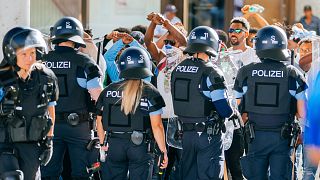Germany
Germany has begun random checks at its borders with five Western European nations, expanding a system of controls already in place at its four other borders.
The police controls began at the borders with France, the Netherlands, Belgium, Luxembourg, and Denmark on Monday morning and are due to continue for six months.
The coalition government is under increasing pressure over migration following recent deadly knife attacks in which the suspects were asylum seekers.
In August, the Islamic State group claimed responsibility for a knife attack in the western city of Solingen in which three people were killed.
Germany has also seen a rise in support for the opposition far-right and conservatives pushing immigration and security concerns higher on the political agenda.
However, experts have questioned the long-term effectiveness of the measure.
"Research has shown usually with these border checks, it's usually not the big fish, it's the smaller fish that will get caught,” says migration expert Svenja Niederfranke.
“And not every single smuggler will get caught either, because obviously they know where the border checks are and they will find different ways to do it."
The border controls are testing European unity because they are seen by some as a step away from the spirit of the EU’s free travel arrangement known as Schengen.













01:17
ECRI warns of persistent racial profiling in European law enforcement
02:24
Racial profiling still rife across the EU, Council of Europe says
00:42
Sudanese refugees feeing war found dead in Libyan desert
01:35
Botswana's FM says country wants to deepen trade with EU amid Trump's tariffs
02:00
EU and African Union ministers pledge to boost cooperation on peace, security and economy
Go to video
"Russia doesn't want a ceasefire", says French president Macron